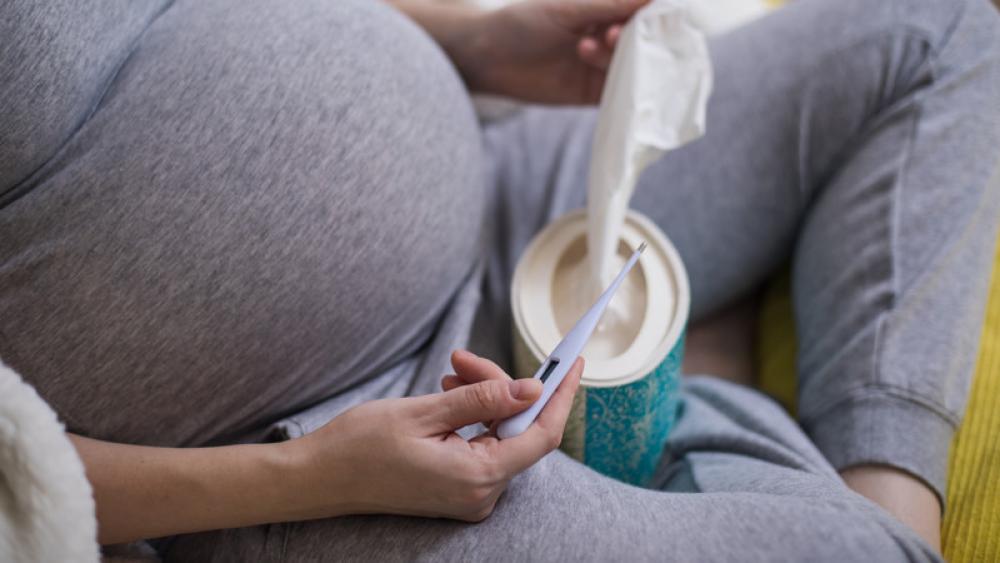




Family Health
COVID-19 and Pregnancy: Here's What We Do Know
Published: March 18, 2020

The coronavirus disease (COVID-19) pandemic has created a lot of fear and anxiety, especially among those with underlying health conditions – or those at greater risk for contracting the disease and suffering related complications.
But what about pregnancy? Does that put women at greater risk? The short answer is: We don’t know yet. But there is a lot we do know. And more information continues to surface.
So, during this time of uncertainty and precaution, I urge all expectant mothers to stay informed in an effort to stay safe.
Getting Familiar With the Basics
COVID-19
COVID-19, which originated in China and has since spread to other countries, refers to a respiratory illness caused by a new coronavirus. The virus spreads from person-to-person, mainly through cough or sneeze droplets that are expelled into the air by an infected person. The virus may also live on surfaces, such as a door handles, public restroom stalls, touch screens, countertops and tables.
Precautions During Pregnancy
Pregnant women should follow the same precautions as everyone else. They should:
- Wash hands often for at least 20 seconds, or use hand sanitizer with at least 60% alcohol when soap and water aren’t available
- Avoid touching the face
- Avoid close contact with people who are sick
- Stay home when sick
- Cover coughs and sneezes with an elbow
- Clean and disinfect high-touch objects and surfaces
- Limit gatherings to 10 people or less
Travel advisories continue to change as the spread of COVID-19 widens, but it’s generally recommended that you avoid traveling when sick. While a babymoon often serves as a couple’s retreat before baby’s arrival, you and your partner might consider postponing that trip and planning a staycation in the meantime. Consider:
- Making a favorite restaurant-inspired meal and hosting a fancy living room picnic
- Having an online dinner party with friends
- Enjoying a movie marathon
- Going on a hike or doing an in-home workout
- Online shopping through local businesses to complete the nursery or baby’s wardrobe
- Exploring various museums and historic sites virtually
The Unknowns Surrounding Mom and Baby’s Risk
We don’t know whether pregnant women who test positive for COVID-19 are at higher risk for complications. But here’s what we do know: High fevers during the first trimester of pregnancy can increase the risk of certain birth defects. Call your health care provider if you develop a fever during pregnancy.
It’s also still unclear whether pregnant women with COVID-19 can transmit the virus to their babies before or during delivery. In the limited cases available for review so far, none of the infants born to mothers with COVID-19 have tested positive for the virus. And the virus wasn’t detected in the amniotic fluid or breastmilk samples.
Breastfeeding While Sick
Breastfeeding – during illness or not – can help protect baby from many respiratory infections thanks to the potentially important antibodies that are delivered. While some woman may choose to temporarily separate themselves from their families while sick, the Centers for Disease Control and Prevention (CDC) recommends that women who intend to resume breastfeeding should pump through the duration of their illness to maintain milk supply. And, if possible, a separate pump should be used. It’s recommended that you:
- Wash hands before touching breast pump and bottle parts
- Follow the manufacturer’s recommendations for proper pump cleaning after each use
- Have someone who is well feed the expressed breast milk to baby, if possible
The CDC also recommends that mothers with suspected or confirmed COVID-19 who choose to continue feeding at the breast should take all possible precautions to avoid spreading the virus to baby. In this case, it’s recommended that you:
- Wash hands before touching baby
- Wear a face mask while breastfeeding
Your Safety at Methodist
The health and safety of our patients has always been and continues to be our No. 1 priority. Our staff is trained to treat sick and infectious patients, and they’re well-versed on infection prevention and control. The following protocols are aimed at protecting our staff, patients and visitors:
- Patients with respiratory symptoms are given masks to wear, helping to contain respiratory secretions and prevent the spread of infection
- Methodist has several designated rooms with isolated airflow, allowing caregivers to treat patients with COVID-19 while preventing contamination
- Methodist has created a special visitor policy that limits the number of healthy visitors to all of our hospitals during the COVID-19 pandemic
Protecting Your Family With Peace of Mind
If you have other kiddos at home, rest easy with the fact that there is no evidence suggesting children are more susceptible to COVID-19. Children can still be infected and act as carriers, but they usually have more mild symptoms or none at all.
Regardless, continue instilling the importance of certain precautions – like frequent handwashing, social distancing and proper preparation. Have plenty of baby supplies on hand – but don’t hoard. And have a plan in place. If you or someone in your family contracts COVID-19 after delivery, you’ll want to have a healthy adult – who’s up-to-date on their immunizations – lined up to care for baby. Being prepared plays a large role in reducing anxiety, something all pregnant women can benefit from.
Most importantly: If you’re concerned that you or someone in your family has contracted COVID-19, please call your primary care provider. Don't have one? You may call (402) 815-7425 (SICK) to be matched with an available provider. If you are seeking testing options, you will be referred to TestNebraska or TestIowa.
For more information and a list of frequently asked questions, please visit the Methodist community information page.
Thank you for helping us keep you and our community safe!
More Resources
- Review Methodist’s visitor policies for maternity floors and the NICU at Methodist Women's Hospital
- Follow Methodist on Facebook, Twitter and Instagram for the latest COVID-19 updates


